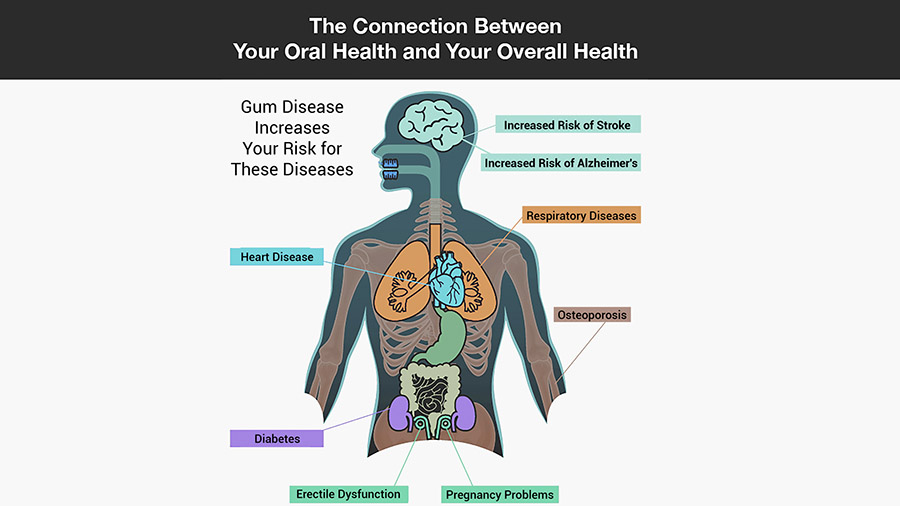Introduction
Good oral health is not just about having a bright smile and fresh breath. It is also crucial for maintaining overall health and well-being. Research has shown that there is a strong connection between oral health and various systemic diseases. This article explores the link between oral health and overall health, highlighting the importance of proper dental care.
Oral Health and Heart Disease
Studies have found a significant association between gum disease and heart disease. The bacteria present in gum infections can enter the bloodstream and cause inflammation in the blood vessels, increasing the risk of heart disease and stroke. Maintaining good oral hygiene and regular dental check-ups can help reduce this risk.
Diabetes and Oral Health

People with diabetes are more prone to gum disease due to impaired immune function. Conversely, gum disease can make it difficult to control blood sugar levels, leading to complications in diabetes management. Proper oral hygiene and regular dental visits are essential for individuals with diabetes to maintain overall health.
Respiratory Health and Oral Health
Poor oral health, especially gum disease, has been linked to respiratory infections such as pneumonia. The bacteria from the mouth can be inhaled into the lungs, causing infections. Maintaining good oral hygiene practices, including regular brushing and flossing, can help prevent respiratory issues.
Oral Health and Pregnancy
Pregnant women with gum disease are at a higher risk of premature birth and low birth weight. The inflammation caused by gum disease can trigger an immune response that may interfere with the development of the fetus. Pregnant women should prioritize oral health and seek regular dental care during pregnancy.
Oral Health and Mental Health
There is a growing body of evidence suggesting a link between poor oral health and mental health conditions such as depression and anxiety. Oral health problems can impact self-esteem and social interactions, leading to psychological distress. Taking care of oral health can contribute to overall mental well-being.
Summary
Good oral health is not just about having a bright smile and fresh breath. It goes beyond that and can have a profound effect on your overall health. Poor oral hygiene can lead to various dental problems such as gum disease, tooth decay, and tooth loss. But the consequences don’t stop there. Research has shown that oral health issues can also contribute to serious medical conditions such as cardiovascular disease, diabetes, respiratory infections, and even pregnancy complications.
The mouth serves as a gateway to the body, and bacteria from oral infections can easily enter the bloodstream, causing inflammation and infection in other parts of the body. For example, the same bacteria that cause gum disease have been found in the arteries of people with cardiovascular disease. This suggests that the inflammation caused by oral infections may contribute to the development of heart disease.
Furthermore, individuals with diabetes are more prone to gum disease, and gum disease can make it harder to control blood sugar levels, leading to complications in diabetes management. Similarly, respiratory infections such as pneumonia can be worsened by oral bacteria that are inhaled into the lungs.
Pregnant women should also pay special attention to their oral health as gum disease has been linked to premature birth and low birth weight. Hormonal changes during pregnancy can make gums more susceptible to inflammation and infection, emphasizing the need for regular dental check-ups and proper oral hygiene.
It is clear that oral health is closely intertwined with overall health. By practicing good oral hygiene habits, such as brushing and flossing regularly, visit go to website ing the dentist for check-ups, and addressing dental issues promptly, you can significantly reduce the risk of developing various health problems.
- Q: What is the link between oral health and overall health?
- A: Oral health and overall health are closely connected. Poor oral health can contribute to various health problems, including heart disease, diabetes, respiratory infections, and pregnancy complications.
- Q: How does oral health affect heart disease?
- A: Gum disease, which is often caused by poor oral hygiene, can increase the risk of heart disease. The bacteria from infected gums can enter the bloodstream and cause inflammation in the blood vessels, leading to cardiovascular problems.
- Q: Can oral health impact diabetes?
- A: Yes, people with diabetes are more prone to gum disease. Conversely, gum disease can make it harder to control blood sugar levels, potentially worsening diabetes symptoms.
- Q: Are there any connections between oral health and respiratory infections?
- A: Poor oral health, especially gum disease, can increase the risk of respiratory infections such as pneumonia. Bacteria from the mouth can be inhaled into the lungs, causing infections or aggravating existing respiratory conditions.
- Q: How does oral health affect pregnancy?
- A: Pregnant women with gum disease have a higher risk of premature birth and low birth weight. Hormonal changes during pregnancy can also worsen gum problems, emphasizing the importance of maintaining good oral hygiene during this time.

Welcome to my website! I’m Austin Gatehouse, a dedicated and experienced Dental Implant Specialist. With a passion for providing exceptional dental care, I specialize in Emergency Dentistry, General Dentistry, Cosmetic Dentistry, and Pediatric Dentistry.
